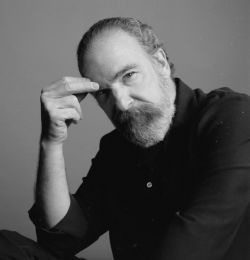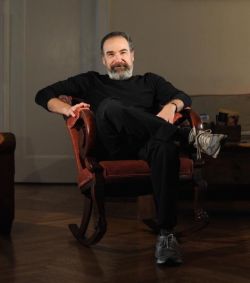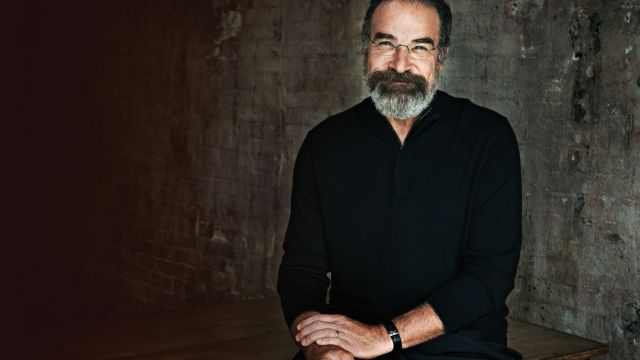Mandy Patinkin: Honouring the Gift
Mandy Patinkin talks about his passions for life and work with Coral Drouyn, ahead of his Australian tour in November 2018.
There’s an old saying among actors that one does ‘films for money, TV for fame, and theatre for love’, but the legendary Mandy Patinkin only partially agrees.
“Of course you do theatre for love – it’s certainly not about making money, and I would have said, a few years ago, that television was just for fame,” he tells me, “but in the last few years I have been so privileged to be part of a television drama of which I am so proud. I love and admire the people I work with, the writers, my co-stars, the character I play – boy am I going to miss him – and the things we have to say about the world and the human condition.”
The character of Saul Berenson in Homeland has made him reportedly the highest paid television actor in America but it’s more than that for Mandy.
“Saul is a better human being than I am,” he says, “but because of him I strive more to be compassionate, tolerant and to aim for more than I thought I could be. I don’t want to lose him from my life, but yes, Season Eight will be the last. I just hope that I retain all I’ve learned from him.”
Long before Homeland or Chicago Hope, The Princess Bride or Yentl, there was the theatre and Broadway, and the voice that Stephen Sondheim describes as a gift from heaven.
“My father and I would always sing together in the synagogue,” he says wistfully, “and I’m conscious that he lost his father far too young. Then I belonged to several choirs, but I never saw myself being a singer, and when I went to Juilliard it was to study acting. It wasn’t what a good Jewish boy from a middle-class family was supposed to do, but my parents always supported that I should do what I believed I was meant to do. And I really believed that I was The Lord’s gift to Shakespeare.”
He chuckles, and I could almost see him shaking his head in amusement, looking for all the world like a kindly Rabbi with Saul’s beard still very much a part of him.
Patinkin still loves Shakespeare and considers that the playwright and Sondheim are poets and philosophers with the ability to turn darkness into light with their words.
“We need them now more than ever,” he comments. “The world is going through huge changes and we have a moral and ethical duty to question who we are and what sort of a world we want to live in. There’s a tendency to create fear; to make us suspicious of our neighbours; to put ourselves first at someone else’s expense. We have to fight that every time we encounter it. And those guys do. They write about the human condition, all our strengths and frailties, and that’s so important. That’s why I love them.”
 Yet, strangely, it was not Sondheim, but an Andrew Lloyd Webber musical which catapulted him to stardom.
Yet, strangely, it was not Sondheim, but an Andrew Lloyd Webber musical which catapulted him to stardom.
“I was appearing Off-Broadway at the Public Theatre for Joe Papp. It was part of the New York Shakespeare Festival workshop and we were doing this musical called Leave It To Beaver Is Dead written by Des McAnuff,” Mandy reminisces. “Des went on to direct a heap of Broadway shows but back then we were all so young. Saul Rubinek and Dianne Wiest (well before her Oscars and Emmys) were also in the cast. I’d just auditioned for Evita and got the part of Che, and I remember saying to the others, ‘Boy, if the audience likes this they should love OUR show.’ What did I know? Our little show died and was never resurrected, and Evita keeps on keeping on.”
Mandy’s life changed forever. Other triumphs like Sunday in the Park with George and Follies brought new accolades, but Evita was the start of it all. So, what was it like to receive his first standing ovation?
“Oh boy,” he says like a kid, “I was in such a daze I couldn’t believe it was happening. My wife (Kathryn Grody) has a brilliant memory. She frequently tells the embarrassing story of that opening night, and I have no reason to disbelieve her, especially since we were newly married. I can’t believe it’s 38 years ago. Apparently when I came out to take my bow at the end the whole audience rose to their feet and cheered. I was frightened by the reaction. It was a shock and I threw up my arms to protect myself, arms outstretched to ward them off, as if I was terrified of being drowned by this wave of applause, and I suppose in a way I was. I’d never experienced anything like it. It happened many times after and I learned to be grateful for the reaction, but I couldn’t understand why it was so extreme when I’d been doing good work at the Public Theatre to audiences of two men and a dog, and the dog was a critic.”
He is reflective before continuing.
“Performing live is always going to be magic because of the instant feedback, the spontaneity, and the fact that you get to hone a performance over many shows encourages a different interpretation. Every performer needs at least one - preferably more - standing ovations, but audiences are getting more savvy and you really have to earn it.”
I ask if he is at all concerned with the future of Music Theatre – with Lloyd Webber and Sondheim reaching the end of their careers and a spate of Disney type musicals.
“The writers for Musical Theatre in the past were the most gifted songwriters of their time, and yet they used their gift not just to write songs but to create stories and have conversations with their audience. They didn’t just create three-minute numbers, they integrated all of our thoughts and feelings about life into a narrative, and that’s why Musical Theatre is so important. I think, I hope, we will get something very special from our friend Adam Guettel in the next few years. He has it in his blood (he is the grandson of Richard Rodgers) as well as his heart. There’s so much honesty and belief in his writing.”
 I asked Mandy, as an artist who has won Tony and Emmy awards and garnered countless nominations, what a young artist needs to be successful. In a combination of talent, passion and commitment, which is the most important?
I asked Mandy, as an artist who has won Tony and Emmy awards and garnered countless nominations, what a young artist needs to be successful. In a combination of talent, passion and commitment, which is the most important?
“It’s the combination of passion and commitment,” he says without hesitation. “Talent isn’t it. Everyone has talent. You just have to find out what yours is. It’s a gift. But commitment, passion - those are things that come from within you. They’re what keep you going. Nobody ever said anything of importance, nobody changed a mind, an opinion, the WORLD even, without commitment and passion.”
But what exactly is it – this “gift”?
“It’s what you give back to the world; that part of you that has something to say,” he tells me earnestly, “and it isn’t confined to performing or creating. The right to vote – that’s a gift. It’s the way to change things, one person at a time, and you must honour that. My way is to be on stage - to entertain - that’s what I do. I’m not a politician, but – as I tell my colleagues - the first syllable of Actor is ACT, and action brings change, so we are all bound to search our souls morally and ethically and act on what we find.”
Patinkin has a new album out. It’s called Diary and contains songs which have been milestones in his life. It’s his 15th or 16th recording - he’s lost count. It’s part of the reason he is touring in November.
“But the concerts aren’t a way to promote the album,” he explains. “It’s really the other way around. The albums are an excuse to do the concerts. At this stage in my life the concerts are the thing I love the most. It’s the most freeing thing in my life, just performing as me. I get to really connect with people. I’m not a character. I’m not a vision on a screen. Nobody has written lines for me to say like, “Hello, my name is Inigo Montoya. You killed my father. Prepare to die.” Kids still quote that to me, and yes, I get a thrill that people remember it, but it’s a role. It’s not me. In concerts it’s all me. I get to sing the songs I like - tell the stories I want to hear again myself. Share with everyone in the theatre. I’ve written a few songs of my own of late, but really I’m a mailman, not a writer.”
I’m confused by the analogy and ask him to explain.
“All the great composers and writers over the years,” he says, “it’s like a personal message to everyone that hears them. But they would just be a reservoir of songs, some works of genius, if no-one delivers them to the audience. So that’s what I am, Mandy the Mailman, delivering Mandy’s choices so we can share them together.”
I can’t wait to see what Mailman Mandy has in the post for us this time round.
Mandy Patinkin performs at Hamer Hall, Arts Centre Melbourne on Sunday 11 November, Concert Hall, Sydney Opera House on Wednesday 14 November and Concert Hall, QPACon Saturday 17 November.
Photographers: Jennifer Altman and Graeme Mitchell.
Subscribe to our E-Newsletter, buy our latest print edition or find a Performing Arts book at Book Nook.

